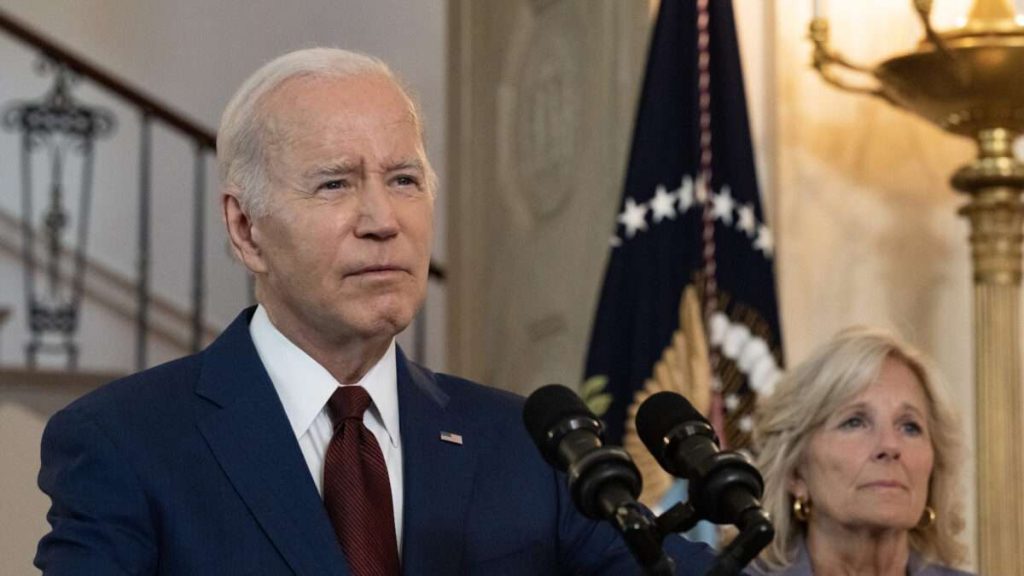When he ran for president in 2020, Joe Biden repudiated his long history of pushing harsh penalties for nonviolent drug offenses, calling for the abolition of mandatory minimum sentences. “Biden supports an end to mandatory minimums,” his campaign said. “As president, he will work for the passage of legislation to repeal mandatory minimums at the federal level.” But by endorsing a bill aimed at cracking down on fentanyl analogs, Biden is doing exactly the opposite.
The HALT Fentanyl Act, which the Republican-controlled House of Representatives approved today by a bipartisan 289–133 vote, would permanently add “fentanyl-related substances” (FRS) to Schedule I of the Controlled Substances Act, the most restrictive category. It defines an FRS as “any substance that is structurally related to fentanyl” and features one of five chemical alterations.
Under the bill’s amendments, anyone caught with specified amounts of an FRS (except for federally approved researchers) will be subject to mandatory minimum sentences: five years for 10 grams or more of “a mixture or substance containing a detectable amount” of an FRS and 10 years for 100 grams or more. If “death or serious bodily injury results from the use of such substance,” the mandatory minimum rises to 20 years.
In a “statement of administration policy” on Monday, the White House called the HALT Fentanyl Act’s provisions “critical components of the Biden-Harris Administration’s 2021 recommendations to Congress to combat the supply of illicit FRS and save lives.” It urged Congress to approve “these critical measures,” which it said would “improve public safety and save lives.”
Twenty-one criminal justice reform organizations responded the next day with a letter to Biden that noted the bill’s “entrenchment and expansion of mandatory minimums.” They added:
You campaigned on a policy of ending mandatory minimums, but the HALT Fentanyl Act does the opposite. Punishing FRS through mandatory minimums is particularly egregious. This is because FRS are defined solely based on their molecular structure and without regard to their pharmacological effect. What this means is that, under the HALT Fentanyl Act, a person could be subject to harsh mandatory minimums for distributing harmless substances or even substances that reverse the effects of fentanyl overdose—just so long as those substances exhibit a particular molecular structure. Enacting a scheme that imposes mandatory 5- or 10-year sentences on people without regard to whether the substance they traffic is harmless or even helpful is, to say the least, inconsistent with the promise to end mandatory minimum sentencing.
Maritza Perez Medina, director of the Office of Federal Affairs at the Drug Policy Alliance, one of the groups that signed the letter, reiterated that complaint today. “The House seems intent on doubling down on the same failed strategies that got us here,” she said, urging the Democrat-controlled Senate to reject the HALT Fentanyl Act. “While it may seem politically expedient to crack down on fentanyl and its analogues, history has shown us…this only creates further harm. Increasing criminal penalties and expanding the use of mandatory minimums, as this bill does, has never reduced the supply or demand of illicit drugs. Instead, it only exacerbates racial disparities in the criminal legal system and creates the conditions for an even more unknown, and more potent, drug supply to flourish.”
Laura Pitter, deputy director of the U.S. program at Human Rights Watch, concurred. “It’s sad to see lawmakers revert to over-criminalization once again when we have 50 years of evidence that the war on drugs has been an abject failure,” she said. “A vote for this bill was a vote against evidence and science. We know that harsher criminal penalties have done nothing to address the overdose crisis, which has only gotten exponentially worse since Congress [temporarily scheduled fentanyl-related substances]. This would make that policy permanent and not only entrenches mandatory minimums but expand them. It will also undermine efforts by scientists to find solutions for problematic substance use and discourage people who [use] drugs who want help from seeking it because they will face harsh penalties.”
The Sentencing Project’s Liz Komar echoed that assessment. “By passing this bill, the House has signaled that Congress is entering a new carceral era,” she said in an emailed statement. “The federal prison population has been on the rise since the beginning of the Biden administration after seven years of decline. The passage of the HALT Fentanyl Act would deepen that trend by doubling down on failed drug policies that prioritize prisons over drug treatment and overwhelmingly harm Black and Brown communities.”
Komar reminded legislators that the punitive approach exemplified by Biden’s Senate career as a hardline drug warrior has never been effective at reducing drug-related deaths. “If mandatory minimums and harsh sentences made communities safer, the overdose crisis would not have occurred,” she said. “We urge the Senate to reject this bill and all expansions of mandatory minimums and reverse this punitive trend.”
Rep. Frank Pallone Jr. (D–N.J.) voiced similar concerns. “This war on drugs—mandatory sentencing, incarcerate everybody—has not worked,” he observed. “It didn’t work on other drugs.” That did not stop 74 of Pallone’s fellow Democrats from voting for the HALT Fentanyl Act.
Rep. Thomas Massie (R–Ky.), the lone Republican to vote against the bill, joined the chorus of criticism. “Instead of passing bills that expand the failed War on Drugs, we should be focusing on regaining operational control of the border,” he wrote on Twitter. “One-size-fits-all mandatory minimum sentences are unwise, and this bill increases the number of defendants subject to them.”
The “failed War on Drugs” has succeeded in one important respect: It has made drug use deadlier. The economic incentives created by prohibition and the pressure applied by attempts to enforce it gave us heroin instead of opium, fentanyl instead of heroin, highly variable black-market opioids instead of reliably dosed pharmaceuticals, fentanyl pressed into ersatz pain pills, drugs laced with unexpected adulterants, and the proliferation of the fentanyl analogs to which legislators are now responding in their usual ham-handed way.
The bipartisan support for the HALT Fentanyl Act shows that most politicians have learned nothing from more than a century of unintended but entirely predictable consequences like these. As drug-related deaths reach record levels not just despite but largely because of their fundamentally misguided efforts, they conclude that the answer is more of the same. Instead of the harm reduction that Biden supposedly supports, they seem bent on harm maximization, and Biden is joining their pernicious panic.
The position that critics like Perez Medina, Pitter, Komar, Pallone, and Massie are taking is the same as the position that Biden took during his presidential campaign, when he presented himself as a drug warrior who had seen the error of his draconian ways and embraced criminal justice reform. Now Biden is reverting to the pattern he established during his 36 years in the Senate, responding to a problem created by prohibition with more prohibition and embracing incarceration as a solution to the harm caused by the government’s doomed and disastrous attempt to stop people from consuming psychoactive substances that politicians have deemed intolerable.
The post Panicked by Fentanyl Analogs, Biden Embraces the Mandatory Minimums He Claims To Oppose appeared first on Reason.com.







